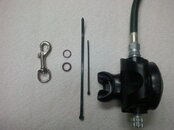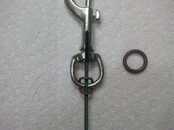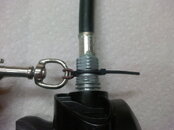A collection of incident reports aren't that though. That isn't to say that they aren't valuable, but for the person collecting the data, the events being described were neither observed nor experienced. We're talking a collection of second and third hand incident reports here.You are using Empirical in the narrow sense of the third meaning above. Other posters are using the word Empirical in the sense of the first and second meanings above. They are also correct in their use of the word Empirical.
You are using an out of date browser. It may not display this or other websites correctly.
You should upgrade or use an alternative browser.
You should upgrade or use an alternative browser.
Long-hose in the time of COVID-19
- Thread starter David Novo
- Start date
Please register or login
Welcome to ScubaBoard, the world's largest scuba diving community. Registration is not required to read the forums, but we encourage you to join. Joining has its benefits and enables you to participate in the discussions.
Benefits of registering include
- Ability to post and comment on topics and discussions.
- A Free photo gallery to share your dive photos with the world.
- You can make this box go away
Can you remind me where the goalposts are?A collection of incident reports aren't that though. That isn't to say that they aren't valuable, but for the person collecting the data, the events being described were neither observed nor experienced. We're talking a collection of second and third hand incident reports here.
The bsac data isn't empirical evidence, it's anecdotal. Same thing I've been saying all along.
Humpty Dumpty again ...
1: originating in or based on observation or experience ...
Of which the data collectors had neither. Second hand and third hand reports are not observing something occurring or experiencing it occurring. That is someone else's recollection of the events.Humpty Dumpty again ...
1: originating in or based on observation or experience ...
If what you're trying to suggest is that any recollection of an event that originated as someone's observation or experience is empirical than there are no anecdotes. Every one of these stories either didn't happen or started as someone's experience.
Whilst I agree some reports are second hand, the majority of incident reports are completed by those involved in the incident; therefore first hand. But even the second hand statements from the Coast Guard are completed in accordance with PACE (Police And Criminal Evidence Act).Of which the data collectors had neither. Second hand and third hand reports are not observing something occurring or experiencing it occurring. That is someone else's recollection of the events.
Here you go. Apologies for the day's delay - I had to take the pictures.Would you mind posting a picture at some point? I'm not 100% sure I understand how the breakaway works.
PICTURE 1 (BS BA 1)
1. Start with a bolt snap - choose whatever size you prefer. The one in the picture is a small one I had available, but I can manipulate this one without gloves.
2. Pick an O-ring. In the picture I have put a yoke valve O-ring (014) and a DIN regulator O-ring (112) in to illustrate options. Either will work (as will many others, I happen to have plenty of these around the shop).
3. Pick a cable tie. In the picture I have put a small, thin 4" cable tie, and a more commonly used 9" cable tie (which i use on regulator mouthpieces). Either will work.
PICTURE 2 (BS BA 2)
4. Wrap the O-ring around the base of the bolt snap.
5. Run the cable tie through the 'ends' of the O-ring.
PICTURE 3 (BS BA 3)
6. Attach the bolt snap to the regulator second stage hose, using the cable tie. (then tighten it down, and clip the end, to 'clean it up')
With the bolt snap clipped to a right shoulder D-ring on your harness, a sharp tug on the second stage will reliably break the O-ring, and free the hose (leaving the bolt snap still clipped to the D-ring). With the thinner 014 O-ring, less of a 'tug' is needed, than with the 112. But, either / both WILL break away quickly.
Hope this helps.
Attachments
For clarity, where the data in the BSAC incident report comes from is published in the report. There is occasional overlap, which the report writers attempt to minimise by collating the reports from multiple sources into the one incident.
From 2018 BSAC incident report source data.
THE GRAPH WON'T APPEAR
Interpolated from the graph
BSAC reports
average 2013 - 2017 - 149
2018 - 160
Coastguard
average 2013 - 2017 - 75
2018 - 80
Media
average 2013 - 2017 - 10
2018 - 40
Other
average 2013 - 2017 - 20
2018 - 18
RNLI
average 2013 - 2017 - 30
2018 - 45
(numbers not accurate due to interpretation of graph)
Explanation of sources quoted.
BSAC report - Report submitted by those BSAC members (witnesses) involved in the incident. May be multiple reports from multiple participants e.g. diver and buddy, surface cover, incident manager, etc. These are members first hand reports of their view of the incident. Not all members choose to submit reports. There is no legal requirement to submit a report. However, an incident report is required if the BSAC third party insurance are involved.
Coastguard - Her Majesty's Coastguard (HMCG) is a section of the Maritime and Coastguard Agency responsible, through the Secretary of State for Transport to Parliament, for the initiation and co-ordination of all maritime search and rescue (SAR) within the UK Maritime Search and Rescue Region.
Media - All forms of news reporting media, print, radio and television. This information is provide by a commercial media news collecting agency.
Other - Sources other than those specified. Including the British Hyperbaric Association, Coroners Courts, Police service, etc.
RNLI -
The Royal National Lifeboat Institution (RNLI) is the largest charity that saves lives at sea around the coasts of the United Kingdom, the Republic of Ireland, the Channel Islands and the Isle of Man, as well as on some inland waterways.
Volunteers: 40,000
Region served: United Kingdom; Republic of Ir...
Main organ: The Lifeboat
Legal status: Registered charity
Under other I should also mention
PADI - Europe, Middle East, and Africa
MOD - Ministry of Defence
RSPOA - Royal society for the the prevention of accidents.
SSAC - Scottish Sub Aqua Club
SAA - Sub Aqua Association
CFT - Coomharile Fo-Thuinn - Irish Underwater Council
BDSG - British Diving Safety Group
For those not familiar with the RNLI, I strongly suggest you google it. It is the principle organisation that is dispatched to rescues by the Coastguard. Those crewing the lifeboats, and providing lifeguard services are all volunteer members of the public who receive no reward or payment. They are available 24hours a 365 days of the year.
Despite their expertise and equipment, there are and have been tragedies. I don't know of any recorded case were they said they would not launch.
From 2018 BSAC incident report source data.
THE GRAPH WON'T APPEAR
Interpolated from the graph
BSAC reports
average 2013 - 2017 - 149
2018 - 160
Coastguard
average 2013 - 2017 - 75
2018 - 80
Media
average 2013 - 2017 - 10
2018 - 40
Other
average 2013 - 2017 - 20
2018 - 18
RNLI
average 2013 - 2017 - 30
2018 - 45
(numbers not accurate due to interpretation of graph)
Explanation of sources quoted.
BSAC report - Report submitted by those BSAC members (witnesses) involved in the incident. May be multiple reports from multiple participants e.g. diver and buddy, surface cover, incident manager, etc. These are members first hand reports of their view of the incident. Not all members choose to submit reports. There is no legal requirement to submit a report. However, an incident report is required if the BSAC third party insurance are involved.
Coastguard - Her Majesty's Coastguard (HMCG) is a section of the Maritime and Coastguard Agency responsible, through the Secretary of State for Transport to Parliament, for the initiation and co-ordination of all maritime search and rescue (SAR) within the UK Maritime Search and Rescue Region.
Media - All forms of news reporting media, print, radio and television. This information is provide by a commercial media news collecting agency.
Other - Sources other than those specified. Including the British Hyperbaric Association, Coroners Courts, Police service, etc.
RNLI -
The Royal National Lifeboat Institution (RNLI) is the largest charity that saves lives at sea around the coasts of the United Kingdom, the Republic of Ireland, the Channel Islands and the Isle of Man, as well as on some inland waterways.
Volunteers: 40,000
Region served: United Kingdom; Republic of Ir...
Main organ: The Lifeboat
Legal status: Registered charity
Under other I should also mention
PADI - Europe, Middle East, and Africa
MOD - Ministry of Defence
RSPOA - Royal society for the the prevention of accidents.
SSAC - Scottish Sub Aqua Club
SAA - Sub Aqua Association
CFT - Coomharile Fo-Thuinn - Irish Underwater Council
BDSG - British Diving Safety Group
For those not familiar with the RNLI, I strongly suggest you google it. It is the principle organisation that is dispatched to rescues by the Coastguard. Those crewing the lifeboats, and providing lifeguard services are all volunteer members of the public who receive no reward or payment. They are available 24hours a 365 days of the year.
Despite their expertise and equipment, there are and have been tragedies. I don't know of any recorded case were they said they would not launch.
+1 for the RNLI.For clarity, where the data in the BSAC incident report comes from is published in the report. There is occasional overlap, which the report writers attempt to minimise by collating the reports from multiple sources into the one incident.
From 2018 BSAC incident report source data.
THE GRAPH WON'T APPEAR
Interpolated from the graph
BSAC reports
average 2013 - 2017 - 149
2018 - 160
Coastguard
average 2013 - 2017 - 75
2018 - 80
Media
average 2013 - 2017 - 10
2018 - 40
Other
average 2013 - 2017 - 20
2018 - 18
RNLI
average 2013 - 2017 - 30
2018 - 45
(numbers not accurate due to interpretation of graph)
Explanation of sources quoted.
BSAC report - Report submitted by those BSAC members (witnesses) involved in the incident. May be multiple reports from multiple participants e.g. diver and buddy, surface cover, incident manager, etc. These are members first hand reports of their view of the incident. Not all members choose to submit reports. There is no legal requirement to submit a report. However, an incident report is required if the BSAC third party insurance are involved.
Coastguard - Her Majesty's Coastguard (HMCG) is a section of the Maritime and Coastguard Agency responsible, through the Secretary of State for Transport to Parliament, for the initiation and co-ordination of all maritime search and rescue (SAR) within the UK Maritime Search and Rescue Region.
Media - All forms of news reporting media, print, radio and television. This information is provide by a commercial media news collecting agency.
Other - Sources other than those specified. Including the British Hyperbaric Association, Coroners Courts, Police service, etc.
RNLI -
The Royal National Lifeboat Institution (RNLI) is the largest charity that saves lives at sea around the coasts of the United Kingdom, the Republic of Ireland, the Channel Islands and the Isle of Man, as well as on some inland waterways.
Volunteers: 40,000
Region served: United Kingdom; Republic of Ir...
Main organ: The Lifeboat
Legal status: Registered charity
Under other I should also mention
PADI - Europe, Middle East, and Africa
MOD - Ministry of Defence
RSPOA - Royal society for the the prevention of accidents.
SSAC - Scottish Sub Aqua Club
SAA - Sub Aqua Association
CFT - Coomharile Fo-Thuinn - Irish Underwater Council
BDSG - British Diving Safety Group
For those not familiar with the RNLI, I strongly suggest you google it. It is the principle organisation that is dispatched to rescues by the Coastguard. Those crewing the lifeboats, and providing lifeguard services are all volunteer members of the public who receive no reward or payment. They are available 24hours a 365 days of the year.
Despite their expertise and equipment, there are and have been tragedies. I don't know of any recorded case were they said they would not launch.
I simply can't watch the Cruel Sea - Penlee Lifeboat Disaster documentary without becoming an emotional wreck! Proper heroes!
For clarity, where the data in the BSAC incident report comes from is published in the report. There is occasional overlap, which the report writers attempt to minimise by collating the reports from multiple sources into the one incident.
From 2018 BSAC incident report source data.
THE GRAPH WON'T APPEAR
Interpolated from the graph
BSAC reports
average 2013 - 2017 - 149
2018 - 160
Coastguard
average 2013 - 2017 - 75
2018 - 80
Media
average 2013 - 2017 - 10
2018 - 40
Other
average 2013 - 2017 - 20
2018 - 18
RNLI
average 2013 - 2017 - 30
2018 - 45
(numbers not accurate due to interpretation of graph)
Explanation of sources quoted.
BSAC report - Report submitted by those BSAC members (witnesses) involved in the incident. May be multiple reports from multiple participants e.g. diver and buddy, surface cover, incident manager, etc. These are members first hand reports of their view of the incident. Not all members choose to submit reports. There is no legal requirement to submit a report. However, an incident report is required if the BSAC third party insurance are involved.
Coastguard - Her Majesty's Coastguard (HMCG) is a section of the Maritime and Coastguard Agency responsible, through the Secretary of State for Transport to Parliament, for the initiation and co-ordination of all maritime search and rescue (SAR) within the UK Maritime Search and Rescue Region.
Media - All forms of news reporting media, print, radio and television. This information is provide by a commercial media news collecting agency.
Other - Sources other than those specified. Including the British Hyperbaric Association, Coroners Courts, Police service, etc.
RNLI -
The Royal National Lifeboat Institution (RNLI) is the largest charity that saves lives at sea around the coasts of the United Kingdom, the Republic of Ireland, the Channel Islands and the Isle of Man, as well as on some inland waterways.
Volunteers: 40,000
Region served: United Kingdom; Republic of Ir...
Main organ: The Lifeboat
Legal status: Registered charity
Under other I should also mention
PADI - Europe, Middle East, and Africa
MOD - Ministry of Defence
RSPOA - Royal society for the the prevention of accidents.
SSAC - Scottish Sub Aqua Club
SAA - Sub Aqua Association
CFT - Coomharile Fo-Thuinn - Irish Underwater Council
BDSG - British Diving Safety Group
For those not familiar with the RNLI, I strongly suggest you google it. It is the principle organisation that is dispatched to rescues by the Coastguard. Those crewing the lifeboats, and providing lifeguard services are all volunteer members of the public who receive no reward or payment. They are available 24hours a 365 days of the year.
Despite their expertise and equipment, there are and have been tragedies. I don't know of any recorded case were they said they would not launch.
So, at least for 2018, more than half are from second and third hand sources (not considering that any of the bsac incident reports may also be).
Which again, doesn't mean they aren't valuable or useful data, but doesn't make them empirical by anyone's definition.
Perhaps a better approach to this conversation would be to say "if we wanted to prove X, what kind of data/tests would we need to provide adequate evidence to do so?"
Similar threads
- Replies
- 20
- Views
- 2,049
- Replies
- 9
- Views
- 475
- Replies
- 42
- Views
- 4,418
- Replies
- 0
- Views
- 242







